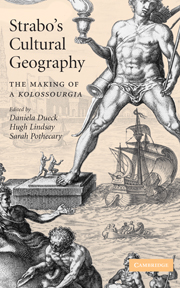Book contents
- Frontmatter
- Contents
- List of maps
- List of illustrations
- List of tables
- List of figures
- List of contributors
- Acknowledgements
- List of abbreviations
- Introduction
- 1 Kolossourgia. ‘A colossal statue of a work’
- 2 Reflections of philosophy: Strabo and geographical sources
- 3 Who is a barbarian? The barbarians in the ethnological and cultural taxonomies of Strabo
- 4 Gender at the crossroads of empire: locating women in Strabo's Geography
- 5 Strabo and Homer: a chapter in cultural history
- 6 Strabo's use of poetry
- 7 Strabo's sources in the light of a tale
- 8 The foundation of Greek colonies and their main features in Strabo: a portrayal lacking homogeneity?
- 9 Ανδρες ἔνδοξοι or ‘men of high reputation’ in Strabo's Geography
- 10 Comparing Strabo with Pausanias: Greece in context vs. Greece in depth
- 11 The European provinces: Strabo as evidence
- 12 Amasya and Strabo's patria in Pontus
- 13 Cappadocia through Strabo's eyes
- 14 Greek geography and Roman empire: the transformation of tradition in Strabo's Euxine
- 15 Josephus' hidden dialogue with Strabo
- 16 Temporal layers within Strabo's description of Coele Syria, Phoenicia and Judaea
- Bibliography
- Index of geographical names
- Index of personal names
1 - Kolossourgia. ‘A colossal statue of a work’
Published online by Cambridge University Press: 18 December 2009
- Frontmatter
- Contents
- List of maps
- List of illustrations
- List of tables
- List of figures
- List of contributors
- Acknowledgements
- List of abbreviations
- Introduction
- 1 Kolossourgia. ‘A colossal statue of a work’
- 2 Reflections of philosophy: Strabo and geographical sources
- 3 Who is a barbarian? The barbarians in the ethnological and cultural taxonomies of Strabo
- 4 Gender at the crossroads of empire: locating women in Strabo's Geography
- 5 Strabo and Homer: a chapter in cultural history
- 6 Strabo's use of poetry
- 7 Strabo's sources in the light of a tale
- 8 The foundation of Greek colonies and their main features in Strabo: a portrayal lacking homogeneity?
- 9 Ανδρες ἔνδοξοι or ‘men of high reputation’ in Strabo's Geography
- 10 Comparing Strabo with Pausanias: Greece in context vs. Greece in depth
- 11 The European provinces: Strabo as evidence
- 12 Amasya and Strabo's patria in Pontus
- 13 Cappadocia through Strabo's eyes
- 14 Greek geography and Roman empire: the transformation of tradition in Strabo's Euxine
- 15 Josephus' hidden dialogue with Strabo
- 16 Temporal layers within Strabo's description of Coele Syria, Phoenicia and Judaea
- Bibliography
- Index of geographical names
- Index of personal names
Summary
καθάπερ τε καὶ ἐν τοῖς κολοσσικοῖς ἔργοις οὐ τὸ καθ' ἕκαστον ἀκριβὲς ζητοῦμεν, ἀλλὰ τοῖς καθόλου προσέχομεν μᾶλλον, εἰ καλῶς τὸ ὅλον. οὕτως κἀν τούτοις δεῖ ποιεῖσθαι τὴν κρίσιν. κολοσσουργία γάρ τις καὶ αὐτή, τὰ μεγάλα φράζουσα πῶς ἔχει καὶ ὅλα, πλὴν εἴ τι κινεῖν δύναται καὶ τῶν μικρῶν τὸν φιλειδήμονα καὶ τὸν πραγματικόν.
(1.1.23)Just as, in colossal statues, we do not seek detail in each individual part but rather pay attention to general aspects [in deciding] whether the whole is finely done, so we must apply the same criteria to these [works]. For it [= the Geography], too, is a sort of kolossourgia, portraying major themes and overall context, except where some matter, though small, stirs the man who desires knowledge and is inclined towards action.
This paper deals with Strabo's description of his work as a colossal endeavour. In the quoted passage, which comes near the beginning of book one of the Geography, Strabo shifts from discussing colossal ‘works’ (in the sense of ‘statues’) to reflecting on his own colossal ‘work’ (in the sense of ‘literary endeavour’). The statues, the literary work and, perhaps, the Roman world of which the literary work is a description, are all distinguished by their ‘colossalness’.
The point of this paper is to draw out the full implications of this ‘colossalness’, which would have been rather different for Strabo and his original audience than they are for the reader of today.
- Type
- Chapter
- Information
- Strabo's Cultural GeographyThe Making of a Kolossourgia, pp. 5 - 26Publisher: Cambridge University PressPrint publication year: 2005



